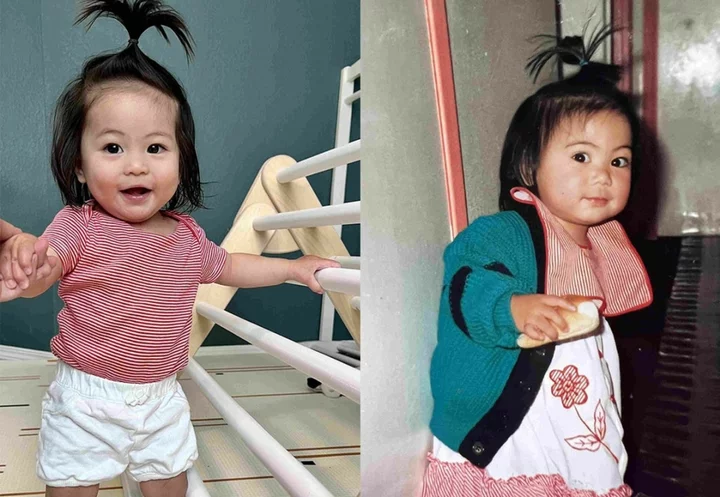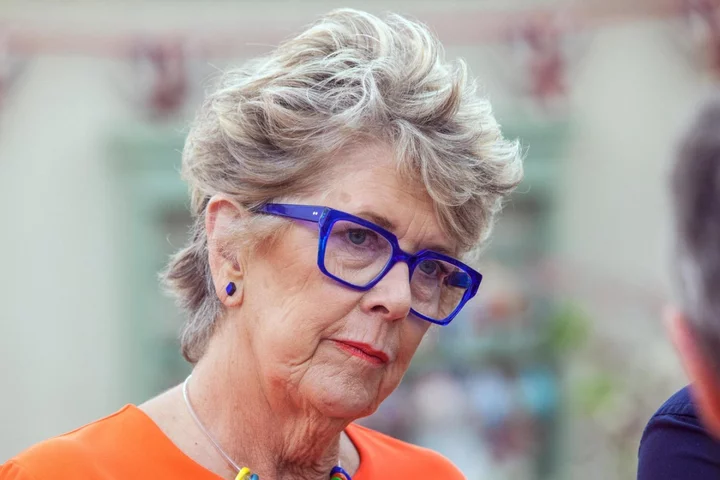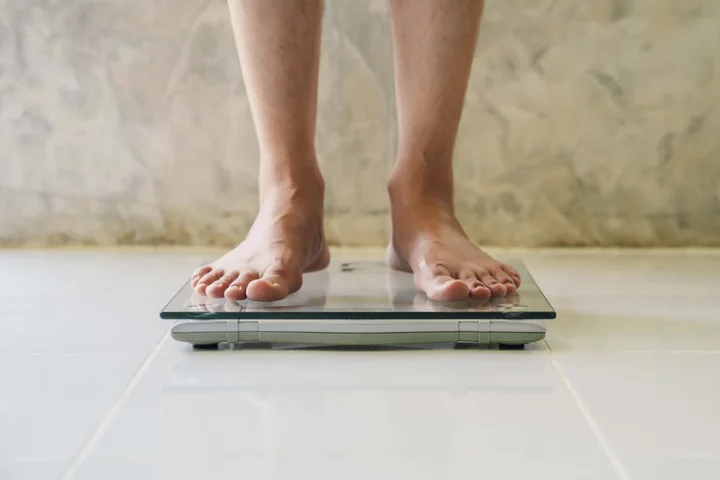
Melanie Skyes reveals Tourette’s syndrome diagnosis: ‘Wired a completely different way’
Melanie Sykes has revealed she’s been diagnosed with Tourette’s syndrome. The 52-year-old I’m A Celebrity... Get Me Out of Here! star revealed the news of her diagnosis on her close friend Alan Carr’s podcast. Speaking of her diagnosis, Sykes said she’s “wired completely differently” and is “only now” understanding the impact of the neurological disorder on her life. Tourette’s syndrome may cause sudden unwanted and uncontrolled rapid and repeated movements or vocal sounds called tics. During the interview, when Carr assured Sykes that it was fine to swear during the conversation, she said: “Oh good, but I’ll try not to, because I’ve just discovered I have Tourette’s. “I describe in the book (Illuminated: Autism and all the Things I’ve Left Unsaid) how I laugh at really inappropriate things. I am wired a completely different way and I’m only just understanding it. “I used to think, ‘What’s wrong with me?’ Now I know it’s everything that’s right with me,” Sykes added. The new diagnosis comes two years after Sykes was diagnosed with autism. The presenter, who is known for shows like Let’s Do Lunch with Gino D’Acampo, said after the diagnosis that “finally, so many things made sense”. Sykes first revealed her diagnosis in an email to readers of her magazine, The Frank. She wrote that finding out she was on the autism spectrum, which can affect the way people with autism communicate and interact with others, was “life-affirming”. She has since been welcomed into the autistic community with messages from mothers of children on the spectrum and adults diagnosed late in life. “They’re so happy I’m talking about it, normalising it,” Sykes told the magazine. “Some people who were too embarrassed to tell anyone now feel they can. “It makes me extremely happy to know I’ve helped.” Sykes’ diagnosis comes after singer Lewis Capaldi recently announced he was taking a break from touring for the “foreseeable future” due to his Tourette’s. The “Someone You Loved” singer struggled with his performance on the Pyramid Stage at Glastonbury this year because of his tics, and appeared visibly moved by the huge audience who helped him sing his song. Following the show, Capaldi said he is “still learning to adjust to the impact of my Tourette’s” and needed to spend time taking care of his physical and mental health before he could return to touring. Read More Kylie Jenner and Jordyn Woods reunite four years after Tristan Thompson cheating scandal Nicole Kidman defends her controversial Vanity Fair mini skirt cover Alan Titchmarsh warns against ‘ill-considered’ rewilding trend in domestic gardens These are the women making waves in the cycling world Nappy changes and tantrums over Michael Gove: I took my toddler to a music festival Demi Lovato says she still struggles with vision, hearing impairment after overdose
2023-07-17 19:51

These are the women making waves in the cycling world
With the Tour de France Femmes kicking off on July 23 for a week of thrills, cycling and entertainment, it will also be highlighting the women making this sport what it is. In its second official year as the Tour de France Femmes, races of this calibre have happened in the past, but never on such a global stage. So, what is happening in the women’s cycling scene, how did we get here, and why does it matter?The women changing the game Women are working hard to bring the sport to people of all backgrounds. “The Amy D Foundation, Black Girls Do Bike, Get Women Cycling and Little Bella’s are all fantastic organisations, helping and encouraging women – and young girls – to get into cycling in spite of age, race and background,” explains triathlon cyclist Kate Dunbar. This year’s Tour de France Femmes will have a determined line-up of women championing the sport. Who should we look out for? “Annemiek van Vleuten was a fantastic contender in 2022, and I expect her to do well again this year. It’s her final year ahead of retirement, so she will want to do well,” says Dunbar. “The course this year is suited to van Vleuten’s skill set and she will have a stronger Movistar team to support this target, including Sarah Gigante and Liane Lippert.”A growing sport There has, in recent years, been a marked increase in the interest of this sport. “There is, without a doubt, a rising interest in women’s cycling,” says Amanda Braverman, global director of brand marketing at cycling tech brand, Hammerhead. “With more events geared towards women’s cycling and growing viewership in the Tour de France Femmes year on year, we’re seeing measurable gains in both interest and access to the sport.” “But we can’t ignore the fact that The Women’s Tour in the UK was cancelled, even though sponsors saw a huge return on investment in 2022, and the Women’s World Tour race Vårgårda, West Sweden was cancelled permanently after 25 years,” says Dunbar. “Even though we are seeing bigger efforts from organisations and the industry as a whole, as with most women’s sports, the Tour De France women’s tournament is still vastly overshadowed by the men’s – we still need more support and encouragement to boost women’s cycling,” she stresses. Cycling as a tool for liberation There is an important link between cycling and women’s liberation, that goes back a long way, beyond racing, to basic transportation. “It gave women social mobility and allowed them to travel faster and further than ever before. They could cycle further for work opportunities, and it also advanced fashion, as women needed cycling-suitable clothing. It allowed women to take control of their fitness and health in an easy way,” says Dunbar. Women’s cycling also subverted norms. “Cycling challenged femininity in the late 19th century, and bicycles were used heavily to support the English suffragettes movement. The bicycle became – and to this day remains – a symbol and a tool of female empowerment, independence, freedom and opportunity,” says Braverman. Trailblazers Some hugely inspiring women came before today’s Tour de France Femmes stars. “Some of the first women to get involved in cycling were true trailblazers, cycling as early as the late 1800s,” says Braverman. “Montreal-based Louise Armaindo raced on the high wheel, also known as the penny-farthing, which was much more dangerous than the modern bicycle. Armaindo set the North American long-distance record in 1872, and was praised as “the champion female bicycle rider of the world”. She also credits ‘The Big Five’ – Lizzie Glaw, Helen Baldwin, May Allen, Tillie Anderson, and Dottie Farnsworth – an influential group of female cyclists who raced in the 1890s, fitting their racing careers into busy lives that often included their families and other jobs. Today, there’s no denying defending champion van Vleuten leads the modern ‘big five’, but who else will be in the mix? Lorena Wiebes is likely to have another great first stage, Elisa Longo Borghini will give it her best shot, alongside the phenomenal Demi Vollering, and maybe Juliette Labous will make even more progress this year. Whatever happens, we are surely in for an exciting week of women’s sport.
2023-07-17 16:20

Nappy changes and tantrums over Michael Gove: I took my one-year-old to a music festival
It’s just after 9pm and lilac hues have spread across Dorset skies, shadows extending over a panorama of marquee tops. Perfect conditions for the first night of End of the Road, whose Friday headliners – Black Midi, Battles and Fleet Foxes among them – are minutes away from stepping on stage. Yet, rather than slipping through the masses to grab a good spot, I’ve been back at my tent for an hour already. Having unfolded a stool in the last of the sun, simmering lentils and a mug full of boxed cab-sav for company, my one-year-old daughter, Nancy, has finally nodded off in the tent, unaware of earlier negotiations between her parents. After an afternoon watching bands from a lower-decibel distance as a family, it’s my wife who’s out tonight, enjoying her child-free break for freedom. Although, with the Pixies – a band beloved since teen years but never seen live – top billing on Saturday night, I felt confident in my call as “White Winter Hymnal” carried on the breeze. We’re a day into our first festival as a family of three, an experience already proving quite a journey. As a sometimes music journalist, I’d covered events across Europe over the past decade, adept at negotiating stage splits, balancing reporting duties and life-affirming experiences with willing accomplices. Of these, End of the Road has remained a regular fixture, an informal end-of-summer meet-up with industry colleagues and friends – as well as my chosen stag-do destination. With a one-year-old in tow, this year would mark a stark contrast. From the freshly purchased family-sized tent – the subject of substantial research and investment, and an attempt to win over a camping-averse wife – to the travel cot, buggy, strings of fairy lighting, endless layers, toys and first-aid trappings for every eventuality, the baggage was endless. Shoulders ablaze, I’d carried it all in as my wife kept our daughter entertained. Stepping into my role as responsible dad, I’d practised the tent’s set-up at home prior to arrival and, with a tangible sense of optimism about the weekend ahead, started separating pegs from poles. Yet, with the tent almost up, something unsettled me. What was that smell? Unzipping the bedroom it hit me. My earlier garden practice run had provided the perfect sheltered toilet for a visiting fox –  evidence of which no amount of wet-wipe scrubbing could remove, resulting in a showdown with the reluctant camper and a smell that would accent a weekend in which expectations were continuously lowered. After my wife crashed back in on Friday night, earlier than anticipated and hamstrung by a fast-developing cold, we wondered if we were up to the challenge. Nancy was having a nice time, happy tracking insects in the long grass or studiously inspecting the contents of her snack bag. But could this equally have been any other field? Had we been too exhausted and distracted to embrace the experience? By contrast, our camping companions had brought their five-year-old, who enthusiastically shared stories about favourite bands and the wicker dragonfly he’d crafted, as his dad talked about the surprise sets he’d happened upon the previous night. Perhaps we’d just taken all of this on too soon. The next morning, I nudged Nancy’s buggy around the site, stopping at the kids’ area, where a neckerchiefed uke player offered up nursery rhymes with instruments for children, which were seized upon with pleasure. Various childless friends were never far away, entertaining our daughter in bursts. Later, after reuniting with my wife, a highlight was bobbing to Los Bitchos’ buoyant afternoon performance with Nancy held aloft, as was a brief glimpse of Jockstrap packing out a small stage in the woods. Yet other moments – flailing nappy changes amid aghast onlookers, straying too close to the stage with a buggy as the light faded and the crowd surged – presented a sharp learning curve. Still feeling under the weather, my wife headed back to the tent with Nancy as the Pixies arrived, Frank Black’s substantial presence now underscored by a pang of guilt. After checking in and being signed off to stay out, I’d joined an excitable crowd for an unannounced late-night set at the Tipi stage, which, after turning out to be one of the tiny handful of bands I’d already seen that day – again sounded another minor chord on my tiny violin. As the skies cleared, we’d discovered corners along the way we’d otherwise never have seen and met a similarly dazed yet determined community of parents With my wife’s health deteriorating further overnight – diminishing her perception of fox piss, at least – we made the call to leave on Sunday morning and I hauled everything back to the car. On the long drive home, and hours before Covid would be confirmed, it had to be asked: had this been fun for anyone concerned? Was this festival too aptly named for a new dad trying to reconcile past and present lives? This all happened in the summer of 2022 and, unfazed, we tried again this year – albeit at the even smaller scale and decidedly family-friendly Kite Festival in Oxfordshire. While Nancy’s advanced age presented new challenges – tentative first steps now a confident swagger – her inquisitiveness also marked her out as the perfect festival companion. Expectations now firmly in check, we let ourselves be led by circumstance and proximity, stopping for whatever drew the eye rather than dashing from act to act, allowing us to slow down and see the world through her eyes. Occasionally we tag-teamed the lineup, each picking a couple of acts to witness unhindered by short attention spans (my wife took former PM John Major’s packed-out talk in the big top, I took Suede). Under the hot sun, our meeting point at the shaded children’s area also helped keep Nancy from turning pink in the sun. Clapping furiously at the end of shadow chancellor Rachel Reeves’s morning debate, her grasp on Labour’s manifesto pledges seems better than most – although this mimicry of crowd behaviour proves an endearing feature at later events, too. An uncontrollable tantrum during Michael Gove’s appearance at a panel discussion saw us quickly extract ourselves from the tent, drawing smiles from an audience impressed by the effectiveness of her heckle. Further priceless memories included dancing together at Candi Staton’s sundown set, Nancy with a brioche in each hand – ear defenders askew – visibly finding her feet. The following day the skies suddenly broke, with an electrical storm closing all stages, sending Birkenstock-clad families sprinting for cover. The one attendee thrilled by it all was Nancy, who careered around cackling as security attempted to keep punters from the marquee’s lightning-conducting metal poles. As the skies cleared, we’d discovered corners along the way we’d otherwise never have seen and met a similarly dazed yet determined community of parents. We still hadn’t nailed the performative kids-at-festivals thing – there was no trolley adorned with decoration or whimsical outfits – but felt comfortable that we’d struck the right balance, fulfilled by a shared experience led by the spontaneity of a child’s impulses. It marked a shift from any naive attempt to carry on with our lives as normal. An alternative, of course, is to leave your family at home. A couple of weeks ago I joined 250,000 others at Glastonbury, my own spontaneity given breathing space once more. Thrilling, yes, but also a weekend that at times left me seeking my small festival companion among the other attendees. I was temporarily overcome watching a daughter on the shoulders of her father as he introduced her to a favourite band, excitedly explaining each musician’s role. “How old? I’ve got one a similar age,” was shared with various others. Yet it was also at Glastonbury, as the temperature nudged into the thirties, that I spotted another dad – fixed grin but dead behind the eyes – pushing three irritable kids in a trolley up a shadeless slope. I nod my solidarity, before skipping off to the bar – relieved, this time, that’s not me. Bumping into Joe Goddard from Hot Chip, whose bandmates collectively call their kids the Micro Chips, he says that of all the children he knows, it’s those who have always been dragged to festivals who have proved the most rounded. Something that resonates with me as the Glastonbury hangover subsides and – reunited with my family – I start looking forward to carving out new shared experiences in crowded fields once more. Read More The earthy magic and lawless energy of being a child at Glastonbury festival Too cool to love these acts 10 years ago? This year’s Glastonbury is for you Music festivals have saved me so many times Demi Lovato says she still struggles with vision, hearing impairment after overdose Marina Diamandis says she has been diagnosed with chronic fatigue syndrome Should I keep my windows closed or open during a heatwave?
2023-07-16 13:57

Demi Lovato says she still struggles with vision and hearing impairment after 2018 overdose
Demi Lovato has opened up about the lasting health struggles she continues to face following her 2018 overdose. The “Sorry Not Sorry” singer recently appeared on SiriusXM’s Andy Cohen Live, where she revealed that her near-fatal overdose left her with vision and hearing impairment. “I wouldn’t change my path because I don’t have any regrets,” she told host Andy Cohen on Wednesday 12 July. “The closest thing that I get to a regret is when I overdosed and I wish somebody had told me, one, that I was beautiful, because I didn’t believe it,” Lovato shared. “And two, I wish that someone would’ve told me that if you just sit with the pain, it passes.” “That overdose caused me a lot of - it actually caused a disability. I have vision impairment and hearing impairment to this day,” the 30-year-old singer said, even admitting that she doesn’t drive anymore due to “blind spots in [her] vision”. However, the Disney Channel alum went on to explain how the lasting effects of her overdose are a “daily constant reminder” throughout her sobriety journey. “Anytime I look at something - like, I have blind spots in my vision when I look at your face,” Lovato told Cohen. “And so it’s a constant reminder to stay on the right path, because I never want that to happen again.” In July 2018, Demi Lovato was rushed to the hospital after suffering “complications” from a reported overdose. She had previously celebrated six years of being sober. In her YouTube documentary series, Dancing with the Devil, which was released in March 2021, Lovato revealed that she became addicted to meth, heroin, and crack cocaine in the weeks before her overdose. “I’m surprised I didn’t OD that night,” she shared in the docuseries. “I just went to town. I went on a shopping spree. That night I did drugs I’d never done before. I’d never done meth before, I tried meth. I mixed it with [ecstasy], with coke, weed, alcohol, oxycontin. And that alone should have killed me.” Two weeks later, she added, she was “introduced to heroin and crack cocaine”. Lovato suffered three strokes and a heart attack during her overdose, leaving her with permanent brain damage. Lovato has been very open about her sobriety journey and mental health struggles. When the “Skyscraper” singer was diagnosed with bipolar disorder in 2011, Lovato shared that the diagnosis provided her with a sense of “relief” because she had spent “so many years struggling” with her mental health. “I was so relieved that I had finally had a diagnosis,” Lovato said at the Hollywood & Mind Summit in Los Angeles last May. “I had spent so many years struggling, and I didn’t know why I was a certain way in dealing with depression at such extreme lows, when I seemingly had the world in front of me just ripe with opportunities.” Lovato is now fully sober after initially adopting a “California sober” approach that involved marijuana and alcohol in moderation. “I no longer support my ‘California sober’ ways,” the singer said in an Instagram Story in December 2021. “Sober sober is the only way to be.” Read More Demi Lovato changed pronouns because explaining They/Them to people was ‘absolutely exhausting’ Demi Lovato explains why she was ‘relieved’ to be diagnosed with bipolar disorder Demi Lovato reveals she used opiates for first time at 13 Marina Diamandis says she has been diagnosed with chronic fatigue syndrome Should I keep my windows closed or open during a heatwave? How to sleep during hot weather, according to experts
2023-07-15 01:28

Marina Diamandis says she has been diagnosed with chronic fatigue syndrome
Marina Diamandis, known under her stage name Marina and the Diamonds, has revealed that she was recently diagnosed with chronic fatigue syndrome. The condition, also known as myalgic encephalomyelitis (ME), resulted in symptoms such as “deep fatigue, numbness, tingling, low appetite, brain fog, rashes, insomnia and a feeling of being ‘poisoned’ for so long”, the 37-year-old Welsh singer wrote in an Instagram update. Diamandis shared that she was only diagnosed with ME after “seven years of health issues”, adding that “it’s been hard to remember what healthy feels like”. “My baseline energy has been at 50 to 60 per cent for a long time,” she continued in her post. “Aside from a few periods of remission, the last seven years have consisted of relying on adrenaline and willpower to push me through each day. “Recovery started two months ago after an unusually bad flare-up that involved shooting pains and burning sensations all over my hands, legs and back,” Diamandis revealed. “After seeing countless doctors, I started working with a functional medicine practitioner to find the root cause of the symptoms.” Functional medicine is a form of alternative medicine that focuses on identifying and treating the root cause of a disease. It falls outside of mainstream healthcare and is not offered by the NHS – although the NHS has recommended the use of some alternative medicines like acupressure and manual therapy for a limited number of circumstances. In her post, Diamandis claimed that her symptoms “are a result of a hypersensitive nervous system” that developed in response to “chronic stress”. “My body has felt stuck in ‘fight or flight’ mode and there were many warning signs it gave me before the worst symptoms set in,” she wrote. Amid her treatment, which she claimed helps to “retrain the nervous system to regulate itself again”, the “Primadonna” singer added that she is “feeling better today than I have in a long time”. “My energy levels are around 65 to 70 per cent most days and the dips I have are shorter,” she said. “Healing is demanding a lot of my energy and attention right now, but the better I feel, the sooner I can get back to my creative life again. I worked yesterday for the first time in a while yesterday and it felt so good.” Diamandis also said that living with ME has given her a “deeper empathy for the millions of people who live silently with chronic illness”. “It’s hard to maintain optimism when the world feels like it’s moving on without you, but hope always exists. Answers always exist,” she said. “The body wants to heal – and what I’ve learned is that you have to work with it, not against it.” ME is a long-term condition with a wide range of symptoms, but the most common one is extreme tiredness. It can affect anyone, including children, but tends to develop between a person’s mid-twenties and mid-forties. An estimated 250,000 people in the UK suffer from ME, with around 17 million sufferers around the world. It is more common in women. According to the NHS, there is no cure for ME. Treatments that may help sufferers manage the condition include cognitive behavioural therapy, energy management and medicine to control symptoms such as pain and sleeping problems. Diamandis released her most recent studio album Ancient Dreams in a Modern Land in June 2021. She embarked on a world tour last year to promote the record. Read More I keep forgetting my dog’s birthday – could a luxury pet party make it up to him? From Princess Beatrice to Louis Theroux: Who is in the Royal Box on the 12th day of Wimbledon? Woman requires eye surgery after using social media hack to remove makeup Should I keep my windows closed or open during a heatwave? How to sleep during hot weather, according to experts Father reveals moment he realised he wanted to leave US and raise children in Spain
2023-07-14 22:18

Sex Education star Patricia Allison: I’ve learned boundaries are extremely important
Patricia Allison misses Ola Nyman, the character she portrayed on Netflix’s Sex Education. “I really do,” Allison admits. “Ola taught me a lot of great things. She’s Swedish, [and] straight in the way she deals with her emotions. “With people, she is very open and unafraid to do what she wants to do. Ola is a force who goes for it. I miss all of that stuff – it was fun to be with her.” With every character the Kenyan-English actress has played, “I’ve been lucky enough to take something away from them. Ola has been a great source of life, love and friendship. I now look out for the little things, try to be present and curious with my kindness without encroaching.” Another character Allison played recently was Kath in the London stage show Jules And Jim. “She was wonderful, striking, super confident, poetic, sometimes quite unlikeable, and made mistakes boldly. I really adored that aspect of Kath,” Allison recalls. The 28-year-old won’t be returning for Sex Education’s fourth and final season (premiering in September), but she’s grateful for the legacy of the teen comedy drama. “Sex Education made people very curious about themselves, gender and all the things we touched on about personal boundaries. It incited people’s passions,” she says. Recently she joined Hendrick’s Gin’s Flora Adora campaign, which immortalises curious thinkers who are shaping this century. Allison is honoured alongside creative powerhouses across art, literature and theatre, including writers Dolly Alderton and Zadie Smith. Hendrick’s found 84% of the 2,000 adults surveyed would consider themselves to be curious, while 54% feel like their curiosity has plateaued over the past two years. In fact, almost a third wish they were more curious about life and its wonders — a sentiment particularly strong with 46% of Gen Z. So how does Allison stay curious? “Self-care is very important to me and the functioning of my career,” she says. “I do a lot of yoga, meditation, I definitely love swimming, reading and things that prioritise me time — a good time — so I can regain my energy, which helps to reinspire myself. “I tend to journal as well, which is the number one thing I do, because I need to be in constant communication with myself and my spirit through writing.” Allison started journalling when she was 18 years old, “After a bad break up, funnily enough”, she admits. “I don’t use any writing prompts. I find that it comes naturally to me, which I really enjoy. It’s really useful for coping with all the things going on in the world, and helps you figure out how you really feel about it. “I used to do it everyday during lockdown, but now I maybe journal twice a week and I’ll do a really long session, to work around my work schedule. Sometimes I’m up early filming and I can’t wake up super early before then. So I prioritise keeping myself both physically and vocally able to do my job properly.” Going outdoors is also important to Allison. “I love exercising in nature. Being out in it, breathing the air, touching trees,” she continues. “I think all of these activities give you time to relax, which is one of the most important things for any creative thing.” For Allison, establishing healthy boundaries hasn’t always been straightforward – especially when navigating the highs and lows of the entertainment industry. From getting nos and doubting herself to working on projects she’s passionate about, the dial is constantly moving. “I think boundaries are extremely important and it’s something I’ve been learning more of as my career develops. You have to be on game, and even better — in my opinion — so I’ve had to become stricter with myself – not strict, but give myself a nice baggy routine that I can stick to. “And this just means making sure I take care of myself properly and making sure I’m eating well and sleeping properly. It’s key. But it’s not always easy. I have to try and create these boundaries, otherwise I won’t be able to do anything.” Allison has adopted the same approach with social media, particularly after Sex Education first came out. “So many people felt connected to that show, and in turn, wanted to connect with the entire cast, which was really exciting. But it can be overwhelming. Overnight so many people are checking out your social media. It’s kind of mad,” she explains. “It’s hard, but I absolutely do not look at my social media first thing in the morning, at all, and surround myself with good people and real-life connections, making sure I’m there for my friends.” Allison is excited to have such a platform where she can reach so many different people, but she adds: “I want to be able to use that in the right way and be in a clearheaded space. And that does take some navigating.” To celebrate the launch of Hendrick’s Flora Adora Gin, Patricia Allison has teamed up with Hendrick’s Gin to rewild the nation’s curiosity.
2023-07-14 16:24

Father reveals moment he realised he wanted to leave US and raise his children in Spain
A father has revealed the exact moment he knew that he wanted to leave the United States and raise his children in Spain. Luna, who goes by the username ​​@lunagoestospain on TikTok, frequently posts videos about preparing for her move with her family. In a recent clip, she noted that a lot of people who live in the US have told her that, while they also want to move abroad, their husbands don’t want to do the same. She went on to direct her camera towards her own husband, before explaining that he didn’t want to move at first either. However, he then shared the experience he had while visiting Spain that ultimately changed his mind about raising children outside of the US. “We go to a cafe and there’s a ton of people walking around,” he recalled about the trip to Spain. “Being from St Louis, that’s not a very comfortable place for me to be in. And you turn to me and say: ‘Have you seen all these people?’ And I’m like: ‘Uhuh,’ and you’re like: ‘None of them have guns.’” He concluded his message by describing his change in perspective about living in Missouri, which has allowed individuals to carry concealed firearms in most places without first obtaining a permit since 2017. “I realised that this weight that I’d been carrying around my whole life wasn’t necessary,” he said. “It’s like what we think is normal is not normal.” In the caption, Luna went on to describe her husband’s comments, writing: “Here’s what shifted for him. I’m sure this’ll piss the right people off. No pun intended.” The TikTok video has quickly gone viral, as it has amassed more than 121,600 views. In the comments, multiple viewers also expressed their interests in raising children outside of America, while also describing their positive experiences when taking trips abroad. “There’s so much mental energy we dedicate to simply existing in the US,” one person claimed. “We lived in Japan for three years. Feeling safe in any neighbourhood or at any time of day or night was amazing,” another wrote. @lunagoestospain Here’s what shifted for him. I’m sure this’ll piss the right people off. No pun intended. #movingabroad #spaindigitalnomadvisa #movingabroadwithpets #movingtospainwithkids ♬ 7AM (Slowed + Reverb) - adrian A third added: “As a father of two young boys, your husband’s explanation has me shook because I cannot disagree.” Earlier this month, Luna shared another video reflecting on her upcoming move to Spain. In the clip, she explained that she’ll miss her family and friends in Missouri, but highlighted some of the benefits to living abroad. “I won’t ever have to tell her she can’t wear light-up shoes because of safety,” she wrote. “No shopping for bulletproof backpacks. I’ll move mountains to make sure she’s as safe as humanly possible.” The Independent has contacted Luna for comment. Luna’s videos also come two years after Missouri enacted the “Second Amendment Preservation Act,” which “subjects local and state law enforcement officers to fines of $50,000 for helping to enforce a federal gun law,” according to the Giffords Law Center. In March of this year, a federal judge ruled the controversial law as unconstitutional, but “has since allowed the law to remain in effect pending appeals,” per Giffords. In recent years, research has found that more Americans are opting to move out of the US. According to the Federal Voting Assistance Program (FVAP), there were nearly 4.8 million Americans living overseas in 2018. This number has continued to grow, as the US Department of State estimated that in 2021, there were about 9 million US citizens living abroad. Read More A scientist's 4-decade quest to save the biggest monkey in the Americas One in six students at English universities taught overseas – watchdog Dylan Mulvaney leaves the US ‘to feel safe’ amid Bud Light backlash Schoolboy almost dies from swallowing magnets for TikTok challenge Woman shares honest review of New York City apartment TikTok mom slammed after making 5-year-old son run in 104 degree heat
2023-07-14 01:48

What is Bell’s palsy? The neurological disorder Tiffany Chen was diagnosed with after giving birth
Robert De Niro’s girlfriend Tiffany Chen told Gayle King in an interview on CBS Mornings that she was diagnosed with Bell’s palsy after giving birth to their daughter Gia Virginia. Bell’s palsy is a neurological disorder which temporarily paralyses one side of the face and causes it to appear droopy and lopsided. According to the Mayo Clinic, the condition “causes sudden weakness in the muscles on one side of the face. In most cases, the weakness is temporary and significantly improves over weeks.” However, it’s not uncommon to experience paralysis on both sides of the face as Chen did. Also known as “acute peripheral facial palsy,” the disorder is an inflammation of the nerve which controls the facial muscles and could potentially be the result of a prior viral infection. While there is no confirmed cause of the neurological condition, The Facial Paralysis Institute has linked many cases to women post-pregnancy. The typical time frame for women to develop symptoms after giving birth is seven to 10 days (about one and a half weeks), according to the institute. Symptoms are likely to worsen within 48 hours (about two days) of when they initially appear and begin to ease up in the following weeks. A full recovery typically won’t take place until six months after. The 45-year-old actress noticed her speech was slurred and she was unable to eat in the week after delivery. “Women who experience Bell’s palsy symptoms after childbirth should pursue treatment immediately. Bell’s palsy that goes undiagnosed or untreated can lead to permanent facial paralysis,” the institute asserted. If the neurological disorder develops during pregnancy, the chance of complete recovery is lower. Per The Facial Paralysis Institute report: “The prognosis for complete recovery isn’t as great as the general population, 52 per cent vs 80 per cent, respectively. It should be noted that the poorer outcomes reported are likely related to the past reluctance of physicians to prescribe steroids and antivirals in treatment.” After eight months of experiencing symptoms, the individual is encouraged to seek long-term treatment, but in general, pregnant women are encouraged to be treated with steroids as any other person experiencing the disorder would. “Botox, neuromuscular retraining, and selective neurolysis” are all “novel treatments” for the permanent condition, according to the institute. “Botox injections can provide safe, reliable, and painless treatment of permanent Bell’s palsy post-pregnancy. When administered to the normal side of the face, the nonsurgical injections relax the overactive muscles, restoring facial symmetry and improving facial appearance,” the institute reported. Neuromuscular retraining is often administered after the individual has also received Botox injections. As for selective neurolysis, “the surgery provides reanimation of the smile that is lost with persistent Bell’s palsy. The procedure involves intricate mapping of the facial nerves to weaken those nerves counterproductive to the smile mechanism.” Read More Robert De Niro’s girlfriend Tiffany Chen reveals she lost ‘all facial functions’ after giving birth ‘It’s like having your legs broken’: The truth about flying as a disabled traveller Vaping is on every corner – so why do we still not know if it’s safe? Robert De Niro’s partner Tiffany Chen says she had Bell’s palsy after giving birth Robert De Niro’s girlfriend Tiffany Chen reveals she had ‘postpartum complications’ How to sleep during hot weather, according to experts
2023-07-14 01:23

Winner of 2023 Gerber Baby search is a rainbow baby: ‘Brought us immeasurable joy’
Gerber has announced the winner of its 13th annual Gerber Baby photo contest. On Wednesday (12 July), Madison “Maddie” Mendoza from Colorado was named “spokesbaby” for the American baby food company. Since 1928, the long-standing family brand has been known for its iconic “Gerber Baby” logo. At 10 months old, Maddie enjoys her baby music classes, swimming lessons, and hiking with her parents. Included in her photo submission was a throwback photo of Maddie’s mother, Crystal Mendoza, who bears a striking resemblance to her daughter, floppy ponytail and all. According to Gerber, Maddie is a “rainbow baby” – the name for a child born after a miscarriage, stillbirth, or loss of an infant. “Being a rainbow baby, Maddie has brought us immeasurable joy with every milestone, snuggle, and moment spent with her enriching our lives and making every day more meaningful and beautiful,” said Crystal. “We look forward to witnessing her grow into a kind, compassionate, strong, independent and worldly individual as we hope to be stationed overseas again to teach Maddie about all the different parts of the world.” The baby food company also shared Maddie’s inspiring background, both of her parents being from first-generation families from the Philippines. Crystal, Maddie’s mom, and her father, Jun, were high school sweethearts and have been together for 22 years. Her dad, who graduated from the US Air Force Academy, currently serves as a Lieutenant Colonel physician in the Air Force. While Jun has been serving the Air Force for 16 years, both of Maddie’s grandfathers also served in the US Navy after coming to America with very little. Her parents hope that their family legacy of “resilience and love” continues on with Maddie. “Gerber has always believed in the magic of babies, and Maddie’s story, filled with love, resilience, and adventure, embodies the spirit of generations of Gerber babies,” said Tarun Malkani, Gerber President and CEO, in a statement. “The throwback submission of Maddie and her mom brought a smile to the judges’ faces and perfectly captured the spirit of this year’s program. We’re excited to partner with Maddie and her family throughout the next year to highlight the full-circle journey from baby to parent.” As winner of the 2023 Gerber Baby photo contest, Maddie will be featured on Gerber’s social media channels and marketing campaigns throughout the year. Additionally, Maddie and her family received a $25,000 cash prize, a year’s worth of free Gerber baby food, and a new wardrobe provided by Gerber Childrenswear. According to ABC News, the family was also gifted an ezpz First Foods Set, a $500 Gerber Childrenswear gift card, a Mommy & Me luggage set from Beis Travel, and a Canon EOS R50 camera and lens kit. The company also matched Maddie’s cash prize with a $25,000 donation to charitable organisation March of Dimes, which is committed to ending preventable maternal and infant health risks and death. Read More Man says he was uninvited from pregnant sister’s wedding after criticising ‘ridiculous’ baby names British toddler has American accent after watching Ms Rachel videos: ‘Payback for Peppa Pig’ Pregnant woman sparks debate after repeatedly asking stranger to give her a seat
2023-07-13 06:19

Prue Leith says the state must ‘sometimes’ step in to tackle child obesity
Prue Leith has said that the state “sometimes” needs to step in to deal with child obesity, after a report claimed that every UK government in the last 30 years has feared being labelled a “nanny state”. The Great British Bake Off judge said politicians must make a “really massive effort” to address issues that contribute to obesity and give people practical lessons and skills. Speaking at a hearing of The Times Health Commission, she said: “Sometimes the state has to be a nanny. We don’t mind the fact that the nanny state insists we go to school to learn maths. “So the nanny state who has to pay enormous sums of money to rectify the problem of obesity has every right to want the nation to learn to like good food and to learn about nutrition.” The Times Health Commission is a year-long inquiry set up to consider the future of health and social care in England. Leith continued at the hearing: “The long and short of getting people to eat healthy food is that if they don’t like it, they won’t do it. Even if they do it for a week they won’t do it for longer. So the only way to tackle it, I think is to get them to like it.” The South African chef cited cooking lessons as an effective way of helping people to learn how to eat healthier. “I think government after government have played around with this at the edges, there has been a little bit of enthusiasm and then it’s dropped again. It just has to be a really massive effort,” she added. Leith also believed there not “any point in lecturing everybody” about nutrition and said: “The poorest person in the country knows that vegetables are better for them than chocolate bars. But the knowledge isn’t enough. “So people who just say, ‘education, education’, yes, education is important. But the main thing is physical. Getting to like it,” she said. Leith’s comments come after the Institute for Government (IfG) published a report in April that claimed “fear of ‘nanny statism’” has resulted in politicians being “afraid of interfering in people’s choices, especially their diets”. Dr Dolly Theis, an expert in obesity policy at the University of Cambridge, told the Guardian: “Some governments have done much more than others. But the IfG is right that a general desire to avoid accusations of nanny statism, a lack of understanding about the issue, and a lack of political prioritisation have all contributed to this chronic policy failure.” This week, the government said in a new report that the link between the “higher consumption of ultra-processed foods and adverse health outcomes are concerning”, but did not recommend that a new labelling system be put in place to inform consumers of the risks. The report stopped short in spite of MPs suggesting in parliament that health warnings should be considered on packaging for “highly addictive” ultra-processed foods. In a previous statement, the Department for Health and Social Care said: “We are taking firm action to help people live healthier lives, including introducing restrictions on where unhealthy food is placed in supermarkets, calorie labelling on menus, and we work closely with industry to make it easier for people to make healthy food choices. “Trials of new obesity treatments and technologies are being backed by £20m of government funding, and we will introduce restrictions banning adverts on TV for foods and drinks high in fat, salt or sugar before 9pm, as well as paid-for adverts online.” Read More Nigella says extravagant dinner parties are a thing of the past – I wish she was wrong From Queen Camilla to Mary Berry: Who is in the Royal Box on the 10th day of Wimbledon? What are pani puri? The much-loved Indian street snack known by different names across the country Jennette McCurdy says her mother would ‘measure her thighs’ when she was 11 Children say ‘I’m bored’ 7 times a week – 7 ways to prevent it What are weight loss injections and what’s the controversy?
2023-07-13 00:23

Jennette McCurdy says her mother would ‘measure her thighs’ and ‘weigh her daily’ when she was 11
Jennette McCurdy has detailed how her mother encouraged her to engage in disordered eating when she was 11 years old. The former Nickelodeon star, 31, previously said that her mother, Debra McCurdy, “explicitly” told her how to eat in a way that would delay puberty so that she could continue to land child roles and therefore support her family financially. In a new interview with Louis Theroux on his podcast, The Louis Theroux Podcast, the iCarly actor opened up about exactly what her mother would do to promote disordered eating. “We partnered up to count our calories, she weighed me daily, she measured my thighs with a measuring tape, she taught me what diuretics were and we read calorie books together,” she recalled. McCurdy said that, to her 11-year-old self, it “felt amazing” to be “partners in crime” with her mother, and Debra told her that it was a “secret we shouldn’t tell anyone”. “I thought that was great because it was like a secret code language, nobody else knows what we’re doing, we could nod to each other and know that we were in this together, and nobody would be part of this.” However, Debra’s tactics to keep her daughter’s calories under control led to an “arduous relationship with food” for McCurdy. McCurdy explained that she began acting when she was six years old and began booking more significant roles when she was 11. She recalled playing characters that were younger than her actual age because she looked younger, and how her mother “made it clear that that was really helpful because casting directors like to cast older kids to play younger roles”. The actor said that one day, she felt a “lump” on her chest area and went to her mother out of fear that it was cancer. Debra has been diagnosed with breast cancer when McCurdy was two years old and later recovered. “I always had this fear of cancer recurring for her, cancer for me… it was just a constant fear,” she explained. “She reached her hand up my shirt, felt the lump and said, ‘Oh, Netty, no, you don’t have cancer, you’re just getting boobies.’ “That was truly as horrifying to me because it meant growing up and it had always been really clear to me that my mum did not want me to grow up. Not just for acting, but it also felt like her worth was tied up in me being young. With me being young, she had something to do, she felt good, me growing up kind of felt like her loss of purpose.” McCurdy asked Debra what she could do to “stop” her breasts from growing, which is when she introduced her daughter to calorie restriction. Speaking about her mother’s own eating disorder, which she had had “for years”, McCurdy recalled that Debra began restricting her food intake at the age of 14 by eating “one donut a day”. “The idea that this was abuse, that this was unhealthy, I couldn’t go anywhere near the reality of it,” she said. “I kept clinging to, ‘Oh, mum’s doing this because it’s what’s best for me, it’s what’s best for my career, she clearly wants what’s good for me,’ and I think a part of her believed that she wanted me to have a better life than she had, but I don’t think she ever stopped to consider what that actually meant, what does that look like, what does my daughter want. “She just assumed that her dreams must be everyone’s dreams, because of narcissism, I guess.” In her 2022 memoir, I’m Glad My Mother Died, McCurdy opened up about the abusive childhood she endured at the hands of Debra, who died in 2013 after her breast cancer returned. During her interview with Theroux, she also revealed that her mother would shower her until she was “17 or 18” and would give her “breast and vaginal exams”. “She would give me breast or vaginal exams in the shower and said that she was checking for lumps – she was just checking for cancer,” she recalled. But when McCurdy voiced how “uncomfortable” the experiences were, her mother became “hysterical”. McCurdy grew up in California with Debra, her father Mark McCurdy, and her three older brothers, Dustin, Marcus and Scott. Her best-selling memoir led to a two-book deal with Penguin Random House’s Ballantine Books label. For anyone struggling with the issues raised in this piece, eating disorder charity Beat’s helpline is available 365 days a year on 0808 801 0677. NCFED offers information, resources and counselling for those suffering from eating disorders, as well as their support networks. Visit eating-disorders.org.uk or call 0845 838 2040. Read More Nigella says extravagant dinner parties are a thing of the past – I wish she was wrong From Queen Camilla to Mary Berry: Who is in the Royal Box on the 10th day of Wimbledon? Kevin Costner ‘ordered to pay estranged wife $129k in monthly child support’, double his offer Children say ‘I’m bored’ 7 times a week – 7 ways to prevent it What are weight loss injections and what’s the controversy? What is group B strep? Charity says pregnant women ‘in the dark’
2023-07-12 22:59

What are weight loss injections and what’s the controversy?
With new research emerging, more questions have been raised about weight-loss injections, how they work, and the risks involved. Here are some of your questions answered. What are weight loss injections? Championed by some celebrities, including Elon Musk, weight loss injections were originally created to treat people with type 2 diabetes and other weight-related health issues. They are a type of prescription-based medical treatment that interferes with your metabolism, regulates your appetite and as a result encourages weight loss. The drugs belong to a class of medications known as glucagon-like peptide-1 receptor agonists, or GLP-1 RAs, which mimic the GLP-1 hormone, released in the gut after eating some food. The only FDA-approved stomach injections to help with weight management are semaglutide — sold under the brand names Ozempic, Wegovy and Rybelsus — and liraglutide — sold under Saxenda. But others are in development. Helen Knight, programme director of the Centre for Health Technology Evaluation at the National Institute for Health and Care Excellence (Nice) said: “We know that management of overweight and obesity is one of the biggest challenges our health service is facing with nearly two-thirds of adults either overweight or obese. It is a lifelong condition that needs medical intervention, has psychological and physical effects, and can affect the quality of life. “But in recent years Nice has been able to recommend a new line of pharmaceutical treatments which have shown that those people using them, alongside changes to their diet and exercise, have been able to reduce their weight.” How do they work? According to Nice’s independent appraisal committee, drugs like semaglutide should only be prescribed to patients as an alternative for weight management — alongside a reduced-calorie diet and increased physical activity in adults. They should also have a BMI of at least 35.0 kg/m2 (this is medically classified as obese), and especially, to people with a BMI of 30.0 kg/m2 to 34.9 kg/m2, have non-diabetic hyperglycaemia (blood sugar that is above normal but below those needed to diagnose diabetes) or are at high risk of other weight-related conditions such as strokes and heart attacks, due to other factors such as high blood pressure and high cholesterol. Using semaglutide as an example, a typical dose for weight loss is 2.4 milligrams, administered weekly as under-the-skin self-injections. How are they going to be rolled out? Nice formally recommended liraglutide, orlistat and semaglutide as medicines suitable to use for weight loss earlier this year. And with such drugs also available through online pharmacies by private prescription, a growing number of people have tried the jabs. If they are prescribed alongside a reduced-calorie diet, increased physical activity, and behavioural support, after a year, people taking them can lose up to 15% of their body weight, with results visible within the first month, according to the Nice clinical trials. Some weight loss injections are available on the NHS, but they are only prescribed under certain circumstances. Following an announcement of a £40 million two-year pilot on June 7, the government have said more people living with obesity will have access to the newest and most effective obesity drugs to help cut NHS waiting lists. What are the possible side effects? Europe’s drug regulator The European Medicines Agency (EMA) is investigating whether patients using some weight loss and obesity jabs are at risk of suicidal thoughts and thoughts of self-harm, which highlights some of the controversy surrounding the phenomenon. The EMA safety committee said it is looking at cases among people who use a semaglutide or liraglutide-containing medicine for weight loss – where “signals” were raised by the Icelandic Medicines Agency. “A signal is information on a new or known adverse event that is potentially caused by a medicine and that warrants further investigation,” the EMA said. “The case reports included two cases of suicidal thoughts, one following the use of Saxenda and one after Ozempic. One additional case reported thoughts of self-injury with Saxenda. “The semaglutide-containing medicine Wegovy and the liraglutide-containing medicine Saxenda are authorised for weight loss, together with diet and physical activity. “Suicidal behaviour is not currently listed as a side-effect in the EU product information of these medicines.” If you have a history of medullary thyroid cancer, gallbladder disease, or even pancreatitis, you should avoid taking weight loss injections like semaglutide. People who do take the prescription drug for weight loss sometimes experience dizziness, fatigue, and gastrointestinal issues — the most common side effects among patients — such as diarrhoea, constipation and gassiness. They are also at risk of getting headaches and stomach conditions including vomiting, bloating and nausea. Read More Charity boss speaks out over ‘traumatic’ encounter with royal aide Ukraine war’s heaviest fight rages in east - follow live Journalist and author Yomi Adegoke on the real-life consequences of social media What is group B strep? Charity says pregnant women ‘in the dark’ Britney Spears: I worked my ass off to get my memoir written
2023-07-12 22:26
